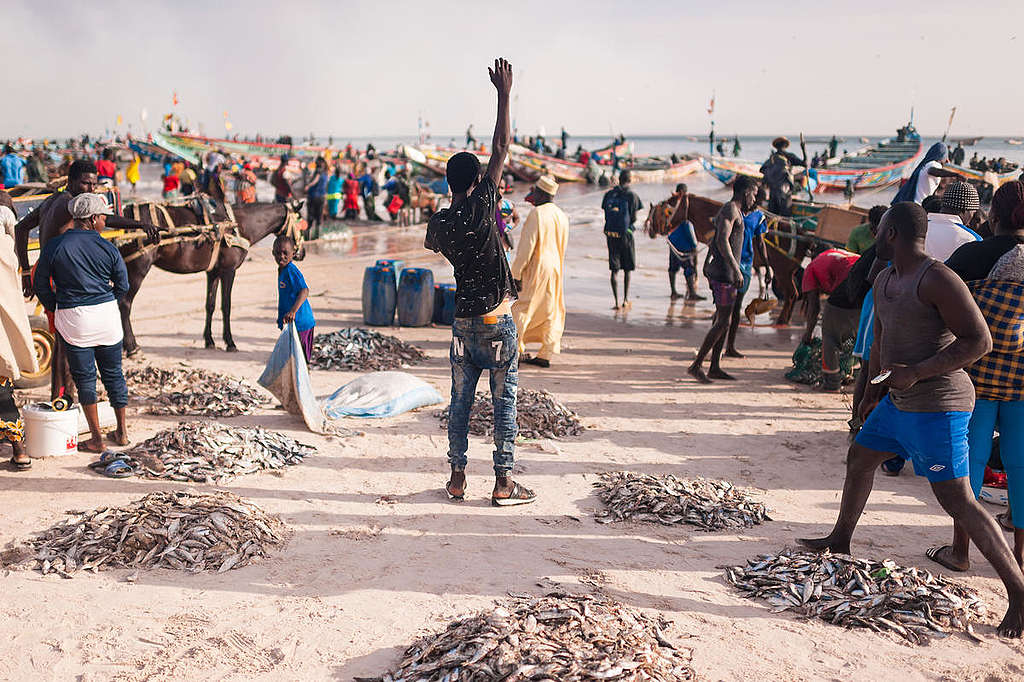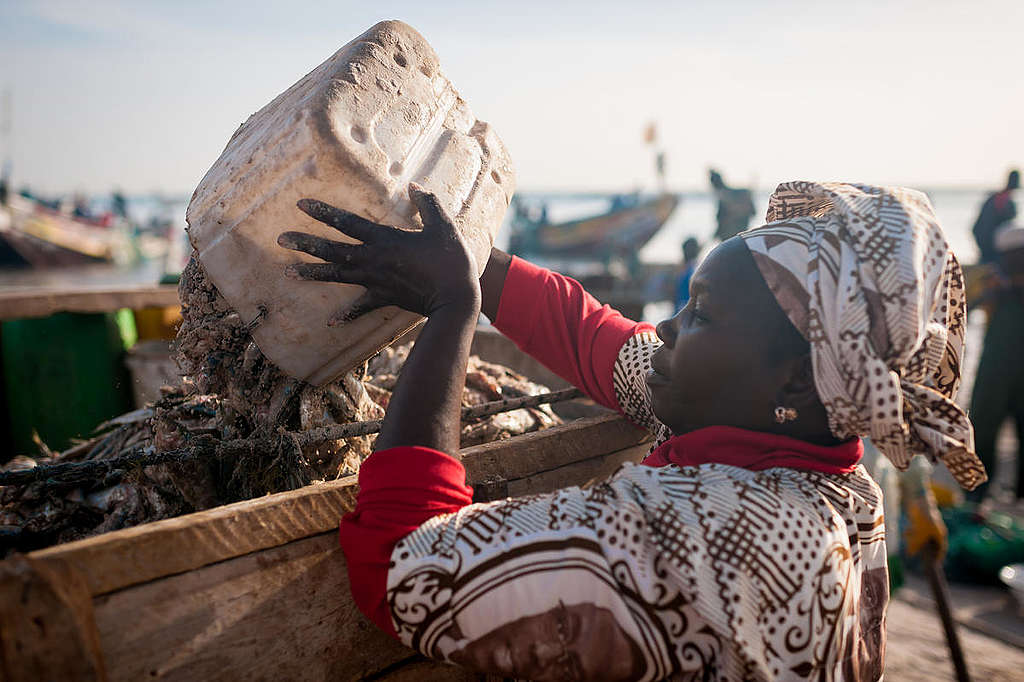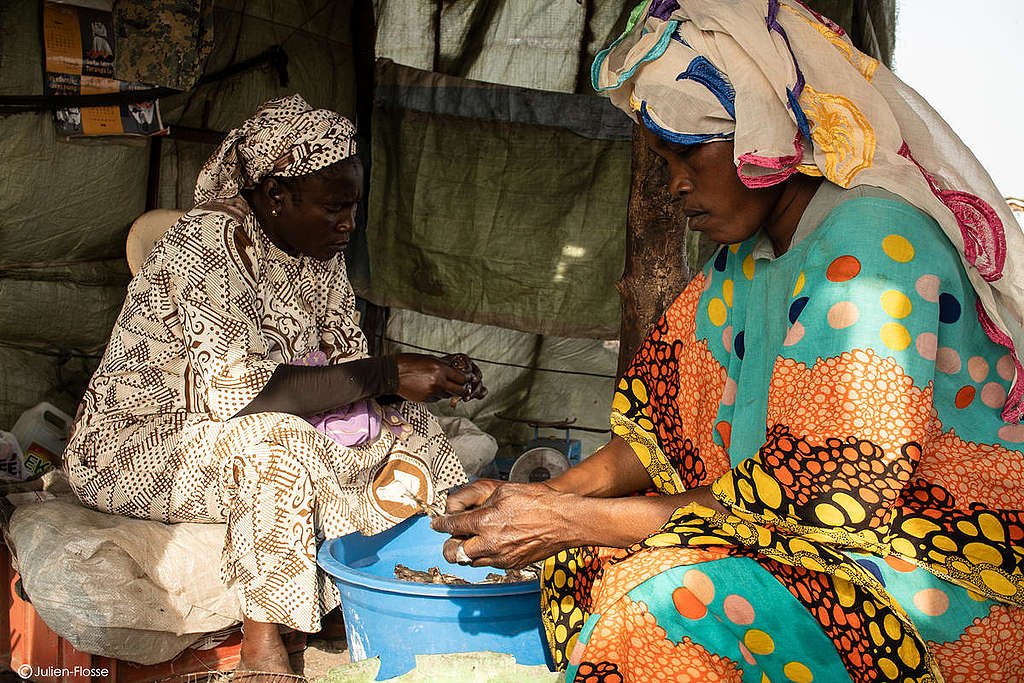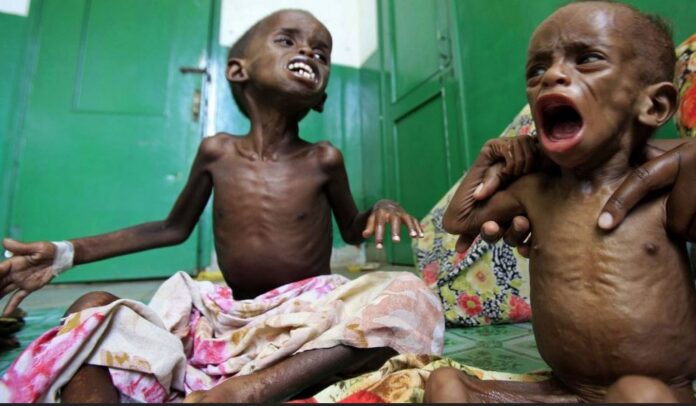Stop big business stealing West Africa’s fish
The fishmeal and fish oil industry is destroying West Africa’s environment and ruining communities. But the people of Cayar have now filed a legal case against the owners of a fishmeal factory, TPM (formerly Barna Senegal), that’s polluting their water and threatening their jobs and access to food. The community wants it shut down. If they win this lawsuit, it will temporarily close the factory. And then the community plans to stop the factory for good.

Fishing communities are raising their voice with Greenpeace Africa to protect local livelihoods and environment that are increasingly under threat from industrial fishmeal factories. © Clément Tardif / Greenpeace
Every year, more than half a million tonnes of fish are caught from West African waters to be processed as fish meal and fish oil to feed farmed fish, livestock and pets in Asia and Europe as reported by Greenpeace Africa and Changing Markets. This amount of fish would be enough to feed 33 million people in a region subject to significant food insecurity and where fish prices have rocketed in many areas as fish populations plunge.
We’ll see you in court!
On 6 October 2022, in a historic legal action the High Court of Thiès was shown shocking laboratory evidence of toxic metals in drinking water from the town. The plaintiffs revealed video documentation of the factory’s truck illegally dumping waste in the lake, which is connected to the same groundwater and how the factory’s management and its owners have repeatedly broken Senegal’s environmental laws. The court adjourned until 3 November, when a judgment is expected.
Fish processors – mostly women – and fishermen have been fighting back for years against the fishmeal factories and the trawlers that supply them. They’ve been protesting and lobbying – but this case is a massive escalation in that struggle. The idea of one town taking a big company to court has really captured the attention of Senegal, and fishing communities are really hoping that this could be a landmark moment for them. The more of us who add our voices to theirs, the more big business and the politicians will have to listen. The people in power are scared of their wrongdoing being exposed.
Factories are stealing our fish
“Most of us fish processors are women. In a cabin beside the wide beach, we gut the fish and clean them, before they are laid out in the sun, where they are salted and smoked. Huge areas are sometimes covered in thousands of neatly arranged fish, spread out over the sand or on stalls. It’s tiring work but it’s honest. But miles out to sea, industrial trawlers are now competing with the piroques for fish, and on the coast, many factories have appeared to grind the fish that should be ours into fishmeal and oil. The factories will eventually steal the last of our fish,” says Fatou Samba, President of Women Fish Processors, in an earlier interview with Greenpeace Africa.

Maitre Bathily, the Collective’s lawyer, said: “The factory has repeatedly broken our country’s environmental law – and here is independent evidence showing the terrible impact that their callous behaviour is having. We can only conclude that the factory has lied to the court, to the media and most shockingly to the people of Cayar and of Senegal.”
Allé Sy, Spokesperson of the Taxawu Cayar Collective, said: “Here is the proof: the factory’s ownership has been breaking the law, polluting our water and callously putting us and our children in danger. And they’re doing it just so they can make a little more profit from the business of ravaging Senegal’s fish stocks. It is despicable. The people of Cayar cannot wait to see them shut down.”
People of Cayar are fighting back
“This is how the global fishmeal and fish oil industry works,” says Dr Aliou Ba, Greenpeace Africa’s Senior Oceans Campaigner. “They steal our fish, they take away our jobs, they make fish unaffordable here, and they even poison our environment. The cash from this evil enterprise goes to big corporations, and who pays the price? It’s the people of West Africa. But no more. The people of Cayar are fighting back.”
Join them.

Stop big business stealing West Africa’s fish
The fishmeal and fish oil industry is threatening access to food and jobs. We can stop them.


